Blog Post
Posted by Dion Todd August 22nd, 2019 4,242 Views 0 Comments
Bible Study, Acts Chapter 28 from Refreshing Hope Ministries on Vimeo.
Today we are going to study Acts chapter 28 verse by verse, and you can follow along in your own Bible if you like. I will be reading from the World English Bible because it is currently the only modern English translation that is copyright free, and I can read the entire Bible on video without any legal drama or breaking anyone’s rules. After you finish this study, please take the accompanying quiz to test your knowledge. Thanks to everyone who has participated so far. Let’s get started:
First, let’s set our location and do a brief catchup. Previously in Acts, Paul boarded a ship in Caesarea in order to travel to Rome and stand trial in front of Caesar. Though Paul had not been convicted, he was part of a group of prisoners that were being escorted by Roman soldiers and taken to Rome. Most of the people with him would die in the coliseum there.
Soon after leaving, their ship was caught in a huge storm that blew them across the sea for two weeks before they ran aground on an island. With the storm still raging, Paul swam ashore on the Isle of Malta, and that is where our chapter begins.
Acts Chapter 28 beginning in verse 1, reading from the World English Bible: When we had escaped, then they learned that the island was called Malta.
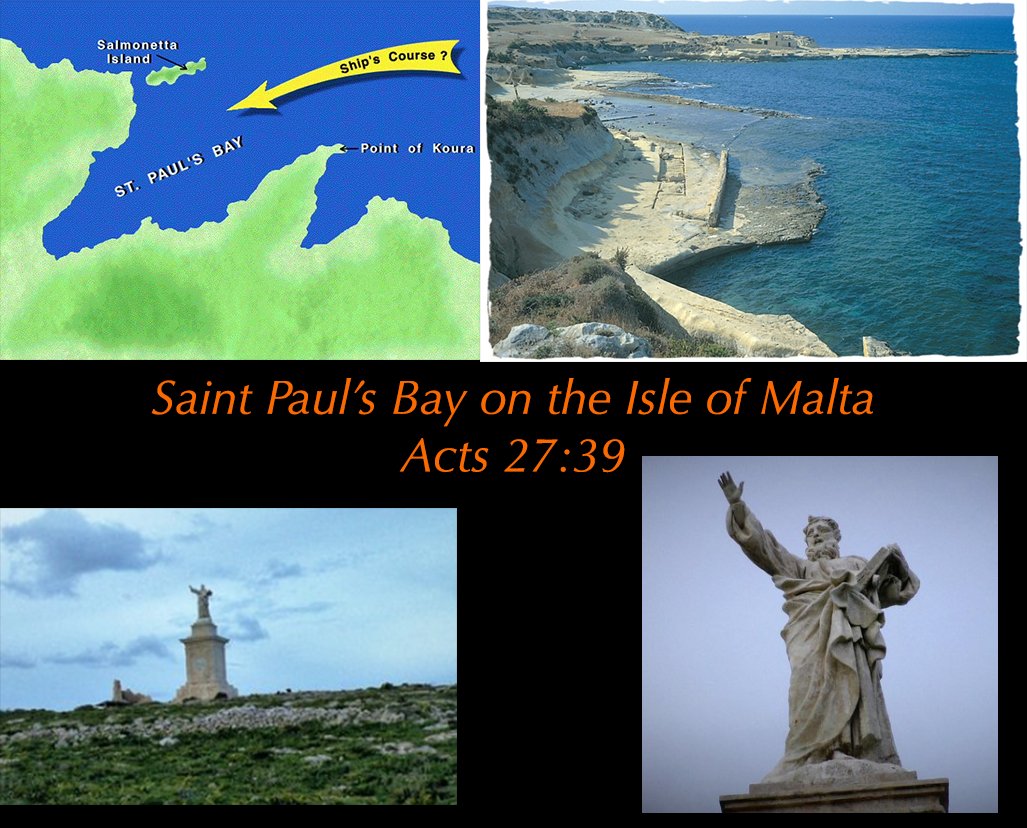
2 The natives showed us uncommon kindness; for they kindled a fire and received us all, because of the present rain and because of the cold.
The writer, Luke, tells the experience first hand, for he was there. He experienced the rain, the cold, and the warm kindness of the natives. The name Malta means “refuge”, a very fitting name for the island. The slow-moving storm that had driven their ship for the last two weeks was now finally passing over and away from them.
3 But when Paul had gathered a bundle of sticks and laid them on the fire, a viper came out because of the heat, and fastened on his hand.
Paul, a servant to the end, went out to gather more sticks for the fire. Though there were 276 others there from the ship, the Great Apostle Paul was not afraid to get his hands dirty and he was gathering wood.
Snakes are cold blooded, and Luke tells us that it was cold outside, so a snake would have been lethargic and barely able to move until it warmed up. When I was clearing a lot early this year and it was still cold, I saw one stretched out along a branch, trying to gather some warmth from the sun. It had come out of hibernation a bit too early and though I got really close, it could hardly move to get away from me. Apparently Paul scooped up a pile of sticks with a viper laying still in them.
When he put his bundle of sticks on the fire, the viper bit him and fastened onto his hand. In other words, it did not let go but sank its teeth into him and held on tightly. Paul didn’t seem to let it bother him. He didn’t begin screaming, “Why God? I can’t take any more of this!” or “Can’t You see I’m serving You?” He didn’t look at those sitting by the fire and say, “You lazy people! This is your fault! If you gathered wood instead of me, this wouldn’t have happened to me!”
4 When the natives saw the creature hanging from his hand, they said to one another, “No doubt this man is a murderer, whom, though he has escaped from the sea, yet Justice has not allowed to live.” 5 However he shook off the creature into the fire, and wasn’t harmed.
The justice they refer to here is a reference to the greek goddess of justice, Dikee. The native people knew that Paul was a prisoner, and there were greek poems of murderers who had been shipwrecked, only to be killed by a viper later. The idea was that the goddess of justice would not permit Paul to escape unpunished, so the snake bite would kill him. They assumed that Paul must have been a murderer for this to happen. That, or he was having a terrible run of bad luck.
Paul shook the snake off into the fire and was fine. Jesus had promised Paul that he would witness about Him in Rome, and there was no snake in the world with the power to stop that. Paul was protected.
6 But they expected that he would have swollen or fallen down dead suddenly, but when they watched for a long time and saw nothing bad happen to him, they changed their minds, and said that he was a god.
As a typical human would, the natives saw Paul in extremes. Either he was terribly evil, or he was considered a god. The truth was that Paul was neither a criminal that deserved punishment, nor a god. The Apostle Paul was somewhere in between.
7 Now in the neighborhood of that place were lands belonging to the chief man of the island, named Publius, who received us, and courteously entertained us for three days.
This was a great blessing to Paul, Luke, and the others traveling with them. Especially considering the misery of the previous two weeks at sea. God gave them a season of relief and replenishment. Luke very accurately details what happened, gives the chief man’s name, as well as how many days that he entertained them. Luke the Physician was a very detailed and accurate writer.
8 The father of Publius lay sick of fever and dysentery. Paul entered in to him, prayed, and laying his hands on him, healed him.
Some believe this sickness could have been Malta fever, which comes from a microorganism found in the milk of Maltese goats. Its symptoms usually last about four months. Could you imagine having the “stomach flu” for four months? Paul visited him, prayed, then laid his hands on him and healed him.
9 Then when this was done, the rest also who had diseases in the island came and were cured.
The rest of the people who were sick came and were healed as well. It was God that did the healing, but His servant Paul was the contact point that the Holy Spirit flowed through.
10 They also honored us with many honors, and when we sailed, they put on board the things that we needed. 11 After three months, we set sail in a ship of Alexandria which had wintered in the island, whose sign was “The Twin Brothers.”
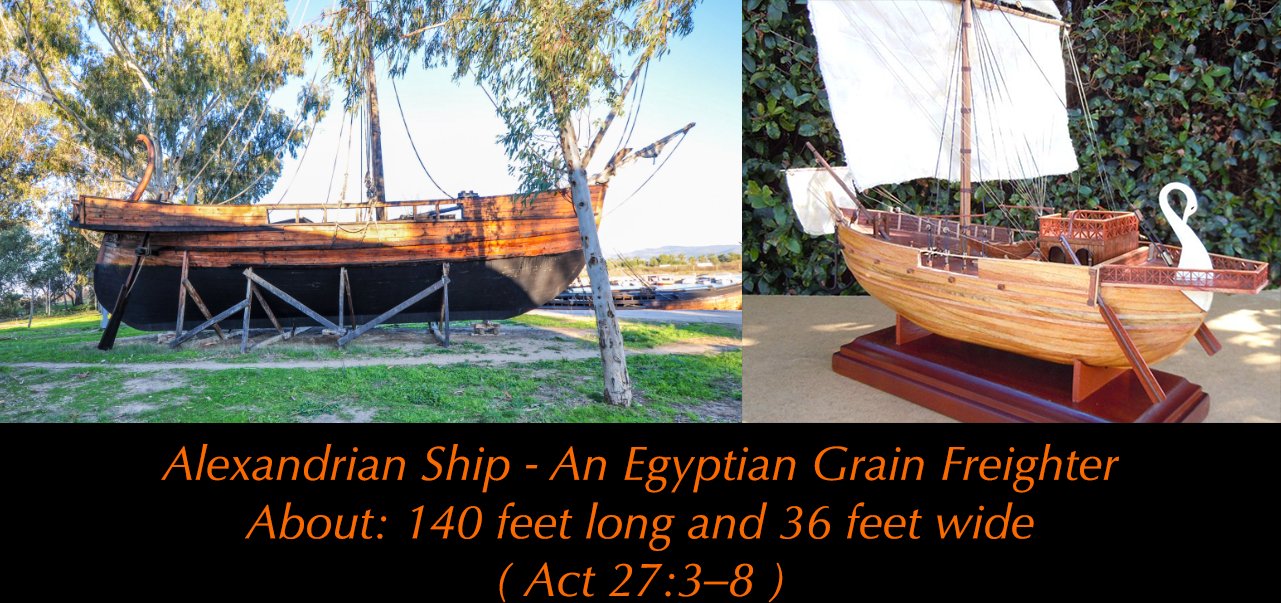
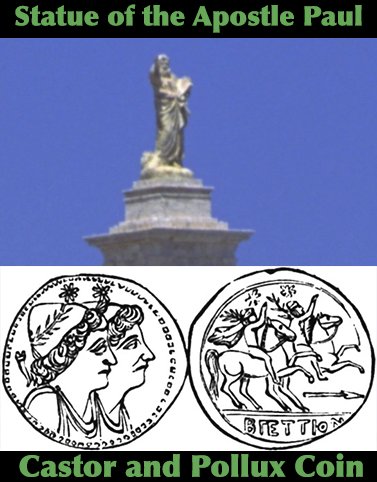
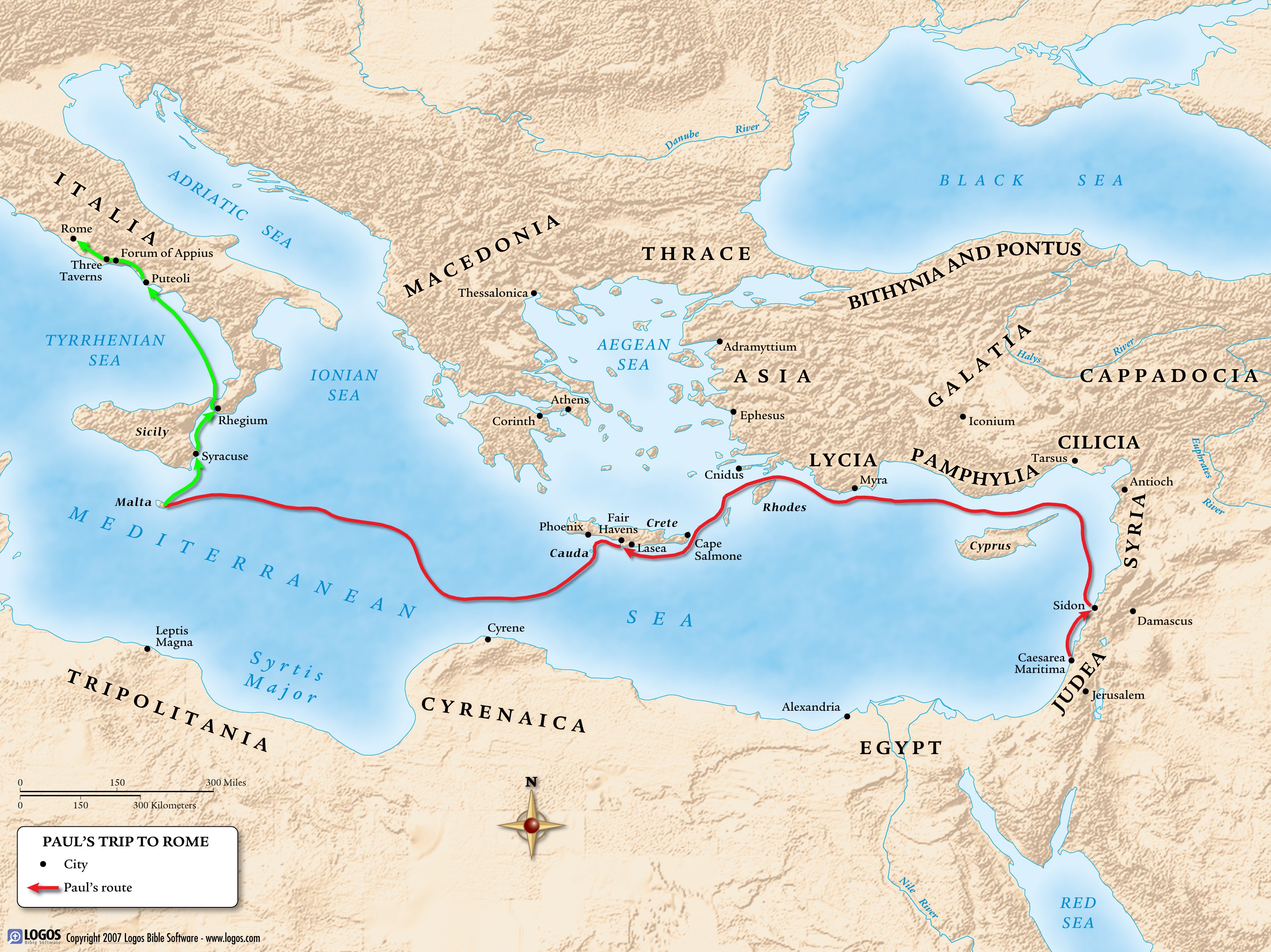
When Paul and the others left Malta, they stopped at Syracuse. The capital city of the island of Sicily. Archimedes, the famous mathematician, had lived at Syracuse. When the Romans conquered the island about 212 BC, a soldier put a dagger to his throat as he worked on a math problem, drawing in the dirt. Archimedes said, “Stop, you’re disturbing up my equation!” and the solider killed him despite orders that he should not be harmed. He is considered one of the greatest mathematicians of all time and invented many inventions, like working water pumps, and a heat ray that used mirrors and sunlight.
15 From there the brothers, when they heard of us, came to meet us as far as The Market of Appius and The Three Taverns. When Paul saw them, he thanked God and took courage.
The Christian brothers in Rome honored Paul by greeting him as the emperors were greeted when they arrived: they went out to meet him as he came into the city, and traveled a full day’s journey to do it, about 43 miles. They met Paul and then traveled with him to the city of Rome. They had received Paul’s letter to the Romans a few years before, so he was well known there. Paul was not the first person to bring the gospel to Rome, as this was his first visit and there were Christians living in Rome already, and he took courage in the brother’s welcome.
16 When we entered into Rome, the centurion delivered the prisoners to the captain of the guard, but Paul was allowed to stay by himself with the soldier who guarded him.
Paul was allowed to stay in his own rented house (Acts 28:30), with a soldier who guarded him. Normally the Roman guards were rotated every four hours, so Paul had a constant supply of people to witness to. He wrote the letter of Philippians during this imprisonment.
17 After three days Paul called together those who were the leaders of the Jews. When they had come together, he said to them, “I, brothers, though I had done nothing against the people or the customs of our fathers, still was delivered prisoner from Jerusalem into the hands of the Romans, 18 who, when they had examined me, desired to set me free, because there was no cause of death in me. 19 But when the Jews spoke against it, I was constrained to appeal to Caesar, not that I had anything about which to accuse my nation. 20 For this cause therefore I asked to see you and to speak with you. For because of the hope of Israel I am bound with this chain.”
Paul called the leaders of the Jews together, as he did in other cities that he visited. He consistently practiced going to the Jews first in every city he came to as an evangelist. This was three days after his arrival in Rome and he was already having a meeting with the leaders of the Jews. He explained his case to them, and how he had been arrested in the temple years ago.
Paul wanted them to know that he was a prisoner because of his belief in Israel’s Messiah, the hope of Israel. As the year A.D. 70 approached, time was running out before an unparalleled national calamity struck a Jesus-rejecting Israel. In ten years or so it would be clear that Jesus was the hope of Israel, yet a hope that many of them had rejected. Jerusalem was destroyed, the Israelite people scattered, and Israel ceased to be a nation until 1948, after world war II.
21 They said to him, “We neither received letters from Judea concerning you, nor did any of the brothers come here and report or speak any evil of you. 22 But we desire to hear from you what you think. For, as concerning this sect, it is known to us that everywhere it is spoken against.”
The religious leaders who accused Paul in Jerusalem and Caesarea knew their case was hopeless. There had no evidence against him at all, and they made no effort to send ahead documents to confirm their case against him.
The word used here for “sect” is the same word used for “heresy.” Christianity was considered to be heresy. Being that it was spoken against everywhere, was a compliment to Paul. He had certainly done his part!
23 When they had appointed him a day, many people came to him at his lodging. He explained to them, testifying about God’s Kingdom, and persuading them concerning Jesus, both from the law of Moses and from the prophets, from morning until evening.
Many of the Jews came to Paul’s house and he spent the entire day, from morning to evening, teaching about Jesus. Paul spoke of the kingdom of God, and he gave them an exhaustive study of how the Old Testament spoke of Jesus, through Moses and the prophets.
Most Jews of the day looked forward to a revived kingdom of David; a powerful king who would rise up and stomp out their enemies. Instead Jesus brought a spiritual kingdom that would take root in men’s hearts before it took over the governments of this world. He was not the Messiah they expected to come.
24 Some believed the things which were spoken, and some disbelieved.
After this remarkable, day-long teaching from Paul, some people believed and trusted Jesus, while others did not. They heard the same message and disbelieved. So even the best teaching, from the best apostle, in the best circumstances, cannot persuade everyone. God allows people the freedom to make that choice for themselves.
25 When they didn’t agree among themselves, they departed after Paul had spoken one word, “The Holy Spirit spoke rightly through Isaiah the prophet to our fathers, 26 saying, ‘Go to this people and say, in hearing, you will hear, but will in no way understand. In seeing, you will see, but will in no way perceive.
27 For this people’s heart has grown callous. Their ears are dull of hearing. Their eyes they have closed. Lest they should see with their eyes, hear with their ears, understand with their heart, and would turn again, then I would heal them.’ 28 “Be it known therefore to you, that the salvation of God is sent to the nations, and they will listen.” 29 When he had said these words, the Jews departed, having a great dispute among themselves.
After Paul spoke from Isaiah chapter 6 (v9-10) about the hardness of the heart, and applied it to them, they had enough. The Jews who believed and the ones who did not began to dispute among themselves.
30 Paul stayed two whole years in his own rented house and received all who were coming to him, 31 preaching God’s Kingdom, and teaching the things concerning the Lord Jesus Christ with all boldness, without hindrance.
Paul had spent more than two years at Caesarea waiting for his case to be resolved (Acts 24:27). Now he spent another two years waiting for his case to be heard before Caesar in Rome. The two years of Paul’s stay in Rome could have been caused by congestion of court business. Rome was the capital of the Roman empire and trials took a long time to come up for hearing.
Paul stayed in his own rented house and probably continued his work as a leatherworker in order to pay the rent. (as he did in Acts 18:1–2 and 20:33–35). Paul was always hard-working. He preached to all that would come and visit him. He also wrote letters during these two years and we have Ephesians, Philippians, and Colossians because of his imprisonment here.
The book of Acts ends here, but the story continues. Luke probably did not record Paul’s appearance before Caesar because the Gospel of Luke and the Book of Acts were written to give the Roman court the background and facts of Paul’s case in his trial before Caesar.
It seems likely that Paul was acquitted of these false charges, and by most estimates was free for another four or five years until he was arrested again, then imprisoned, condemned, and executed in Rome at the command of Nero in A.D. 66 or 67—according to historical tradition of the early church.
Acts Wrap-up:
In this study of the book of Acts, we read about Jesus ascending to heaven, the coming of the Holy Spirit as tongues of fire on the day of Pentecost. Thousands were saved and began joining the small group of believers.
The church began to be persecuted. James was beheaded, Stephen was stoned, and the believers scattered across the land taking the gospel of Jesus with them. Philip went to Antioch, miracles followed him and soon a church grew up there that became their home base.
Peter and John performed miracles, healing the sick and raising the dead. When Peter was arrested, angels let him out of jail. The young man Paul who was there when Stephen was stoned, was introduced to the Lord Jesus on the road to Damascus when he was suddenly struck blind. A disciple named Ananias prayed for him, he was healed, and he became known as the Apostle Paul.
Paul was an amazingly dedicated man. He and his friends like Barnabas, Silas, Timothy, Luke and others traveled from town to town preaching to who ever would listen. Many times he was beaten. Once he was stoned, his body dragged out of town and left dead, but when the disciples prayed for him, he got back up and went back into town.
Paul spent a lot of time in prison and Jesus Himself appeared to him there. From jail, Paul wrote many of the books of the New Testament. The Gospel of Luke and The Acts of the Apostles were probably written by Luke as part of Paul’s defense when he was sent to Rome to stand trial before Caesar.
Foxe’s Book of Martyrs records the persecution of the Apostle Paul this way: “This apostle and martyr was a Jew of the tribe of Benjamin, born at Tarsus in Cilicia. He was at first a great enemy to, and persecutor of the Christians; but after his miraculous conversion, he became a devout follower of the Lord. At Iconium, St. Paul and St. Barnabas were near being stoned to death by the enraged Jews; after which they fled to Lyconia.
At Lystra, St. Paul was stoned, dragged out of the city, and left for dead. He, however, happily revived, and escaped to Derbe. At Philippi, Paul and Silas were imprisoned and whipped; and both were again persecuted at Thessalonica. Being afterwards taken at Jerusalem, he was sent to Cesarea, but appealed to Caesar at Rome. Here he continued a prisoner at large for two years; and at length being released, he visited the churches of Greece and Rome and preached in France and Spain. Returning to Rome, he was again apprehended and, by the order of Nero, martyred, by beheading. Two days are dedicated to the commemoration of this apostle; the one to his conversion, which is on the 25th of January, and the other to his martyrdom, which is on the 29th of June, A.D. 72.”
This concludes today’s chapter of our ongoing Bible Study. Thank you for participating and being a part of Refreshing Hope! To complete this study, we invite you to test your knowledge with the accompanying quiz!
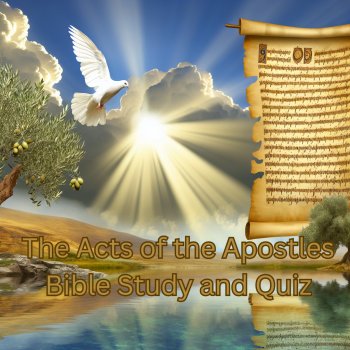
This blog post has an accompanying Bible quiz: Acts Chapter 28

